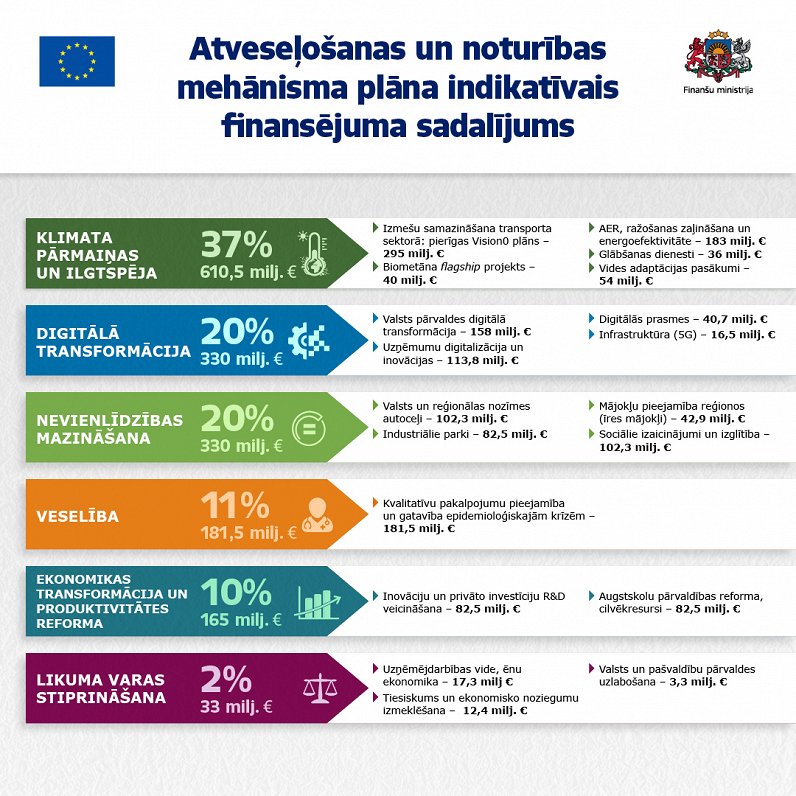This week the government approved the Recovery and Resilience Facility Plan, which will distribute €1.65 billion to various goals – money that Latvia will receive from the European Union to recover from the crisis caused by Covid-19. The plan is to allocate €82 million for industrial parks - even though several municipalities already have difficulties finding tenants for industrial parks already built, according to 'De Facto'.

For example, the municipality of Carnikava, using both its own and fund money, upgraded the territory in which the Soviet Army used to be located. The aim of the project will be achieved if there are two hundred new jobs created and ten million in investments. Tenants for 4 of the 11 land plots have been found. The contracts promise to create sixty new jobs.
Carnikava was one of the most ambitious investment projects to attract entrepreneurs. The Chair of the Council remains convinced that the three-year target will be achieved.
Daiga Mieriņa, chair of the county council of Carnikava, said: "Business responds very quickly and sensitively to anything that happens in the country and it is not just our [project]. Of course, it has to be a huge job to attract entrepreneurs to such conditions because they have commitments. For them, the plot on the one hand is very cheap: it is just about two euro per square meter, which might seem very cheap, but each has these commitments - so half a million euro investments, 15 jobs, and all needs to be done in three years."
Over the past five years, two European fund programs have available funding, with a total of nearly a hundred million euro, which municipalities can use to set up infrastructure for business purposes. Including the construction of production or office buildings. The targets are considered to have been achieved if not only are the tenants found, but they have also invested their own funds and created a certain number of jobs. The largest (€86.5 million) is a program of funds to clean up degraded areas and create a business environment in these places. It is one of the most complicated fund programs for municipalities, and several have failed to find tenants even with repeated auctions.
Solita Dombrovska, director of the Central Finance and Contracting Agency (CFLA) Infrastructure Development Department, said that there are many municipalities where these projects have been very successful and production plants are already working at full capacity, but it is not everywhere.
"In our view, it also depends heavily on the way the local government had done its homework and identified the interests of these potential producers and investors. And, of course, there are also situations where municipalities have repeatedly tried to organize lease auctions – up to five times, on average – three, four times these auctions have been carried out, and no tenants have been found," Dombrovska said.
For example, in Jēkabpils, the local government built a grain elevator and food processing plant in an abandoned former plant area, hoping to see Latvia's largest grain processors. However, the first two auctions did not see any results. Goldkorn Ltd applied for the third auction, but the lease agreement was not concluded. Auction 4 has now been closed, in which Goldkorn, contrary to the local government's expectations, was the only bidder. A draft contract has been sent to the company, which has not yet been signed. A member of Goldkorn's board, Valentīns Kukla, told “De facto” that the project imposed serious obligations.
A degraded area in the city center has been transformed into the 'Creative Industrial Center' by the Aglona municipality council. The tenant is expected to be found by means of a third auction.
“De facto” contacted a number of entrepreneurs identified in the project application. One of them acknowledged that they did not want to start a new project at the moment. Another pointed out that they did not know about the auction at all.
“These interests were identified, let us say so, in the distant 2016, maybe a little later. We're in 2021 right now. And, of course, many projects are over, but many will continue, so its needs are likely to have changed as well as its market requirements in the specific municipalities,” said CFLA spokeswoman Dombrovska.
Despite the issues, the responsible ministry considers that municipalities should continue to build infrastructures for business purposes. With this week's government decision, an additional €82 million will be devoted to building industrial parks in the regions. This amount is earmarked for these purposes in the Recovery and Stability Mechanism Plan. It is the money that Europe has allocated to Latvia for the consequences of Covid-19.
Only this time will it no longer be guaranteed that money is raised for for each municipality – they will have to compete in an open competition with their projects.
“The negative side of the quota system is that municipalities are very diverse and there are municipalities that are very successful in carrying out projects, are achieving results and have further projects to implement. While other municipalities have not yet submitted projects under their quota in the past year. Consequently, the quota system demotes and increases the risk that these will be not really smart projects, but projects to fill their quota,” said Sandis Cakuls, deputy State Secretary at the Ministry of Environmental Protection and Regional Development.
It is intended that the Investment and Development Agency could also help local governments to find partners and tenants, looking also beyond Latvia's borders.





























